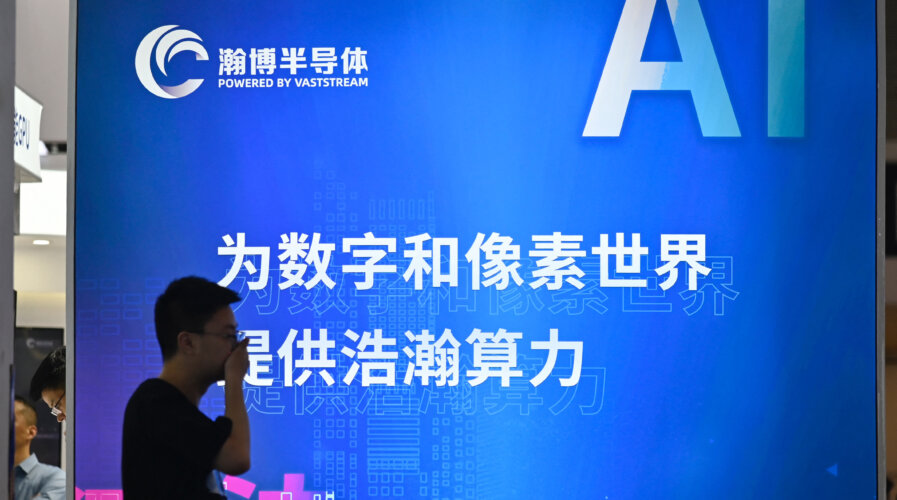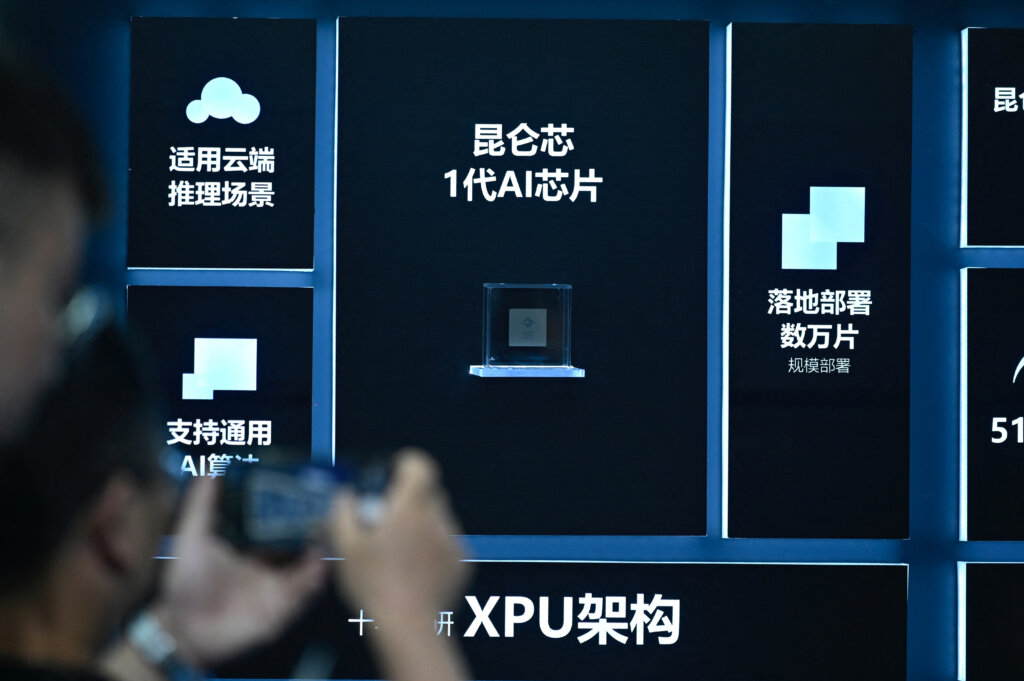
China has approved this year’s first batch of LLMs following last August’s approvals of generative AI services.Photo: The World Artificial Intelligence Conference (WAIC) in Shanghai on July 6, 2023. (Photo by WANG Zhao/AFP).
China unleashes AI wave, approves 14 LLMs for commercial use
- China has approved this year’s first batch of LLMs following last August’s approvals of generative AI services.
- The approvals come as the US ponders limiting Chinese access to US cloud providers, to stop the country building advanced LLMs.
- China has given the green light to over 40 government-approved LLMs and related applications.
In the wake of ChatGPT’s remarkable success, China decided to forge ahead in the AI segment by establishing a governmental entity dedicated to the technology. Tasked with implementing a national standard for large language models (LLMs), crucial components in training AI chatbots such as ChatGPT, this initiative underscores Beijing’s strategic approach to minimize potential disruptions while harnessing the transformative power of AI in traditional industries. It was in July 2023 when a newly formed China Electronic Standardization Institute, operating under the Ministry of Industry and Information Technology (MIIT), began to develop a local standard for LLMs.
Announced at the World Artificial Intelligence Conference (WAIC) in Shanghai, the Institute enlisted tech giants Baidu, Huawei, 360 Security Technology, and Alibaba to spearhead a task force to shape this new LLM standard. The push for standardization mirrors the local authorities’ recognition of AI’s potential to fuel economic growth and serve as a valuable daily tool.

An AI chip of Kunlunxin is seen on display during the World Artificial Intelligence Conference (WAIC) in Shanghai on July 6, 2023. (Photo by WANG Zhao/AFP).
Simultaneously, it highlights their cautious approach to the associated risks, emphasizing the need for regulated use of this transformative technology.
The world’s first ruling on generative AI
In April 2023, Beijing introduced a draft regulation for generative AI services, which eventually became law on August 15. The final regulation is more favorable than the original proposal, emphasizing development and security. It encourages innovation in generative AI and adopts a tolerant and prudent approach to regulation. According to new rules, all generative AI content services provided to the Chinese public, covering text, pictures, audio, and video, will be subject to these rules.

People examine an AI product of Baidu during the World Artificial Intelligence Conference (WAIC) in Shanghai on July 6, 2023. (Photo by WANG Zhao/AFP).
The updated regulations exhibit a more supportive tone, eliminating punitive terms from the earlier draft and signaling a positive stance towards innovative development in generative AI. Not too long after the law took effect, China ushered in a new era with the approval of its inaugural batch of generative AI services on August 31, 2023.
Notable technology players, including search behemoth Baidu and AI specialist SenseTime, have been given the green light to unleash ChatGPT-like chatbots upon the public. Baidu, SenseTime, Zhipu AI (a state-backed startup), and Baichuan, a new venture supported by Tencent Holdings and led by Sogou co-founder Wang Xiaochuan, then collectively declared the removal of “invite-only” or “beta testing” labels from their AI chatbots in separate statements.
Notably, their innovative generative AI services, exemplified by SenseChat from Shanghai-based SenseTime, have since been readily accessible on their websites or downloadable via Chinese app stores.
China wants to champion AI
After months of stringent control, China is now championing the embrace of AI across its businesses and populace. In a transformative surge, the country has granted approval for 40 LLMs and AI applications over the past six months, with a notable batch of 14 gaining the green light just this week.
In short, in a sweeping shift, Beijing is urging the people of China and its small-scale industries to embrace and wield AI on a grand scale. The once-tight reins on accessible LLMs and AI applications have loosened, allowing a diverse array of LLMs to flood the public sphere. In fact, China’s recent approval of the first batch of LLMs this year marks a significant leap forward in the nation’s AI landscape.
In contrast to previous approvals featuring GenAI models, this latest batch incorporates several industry-specific LLMs, highlighting the concerted efforts in mainland China to drive AI development and regulation that aims to enhance enterprise efficiency.
“A total of 14 LLMs and enterprise applications were recently given the green light by authorities for commercial use, according to local media reports and company announcements, including those from smartphone giant Xiaomi, AI specialist Beijing Fourth Paradigm Technology Co, and Beijing-based tech unicorn 01.AI, founded by venture capitalist Lee Kai-fu,” a report by South China Morning Post reads.
SCMP also listed some of the latest approvals, including startup Frontis.AI for its industry-specific LLMs – “Pinshang” and “Moxiaoxian.” These LLMs provide consumer product companies with insights and support for product and marketing innovation. Frontis.AI plans to offer more tailored services to its enterprise clients. Additionally, cybersecurity firm ThreatBook’s XGPT AI model, the first LLM focused on internet security in China, and video solutions provider XinYi Tech’s LLM, specializing in AI-powered video generation and processing tools, were approved this month.
ThreatBook’s LLM helps enterprises analyze potential security threats, while XinYi Tech’s LLM targets advertising, education, media, and e-commerce applications, SCMP said. Noteworthy AI applications approved in January include an intelligent resume-polishing tool from Chinese online recruitment platform Zhaopin, chatbots from e-commerce services firm Beijing Zhidemai Tech, and mobile books-magazine-and-comics provider iReader Technology.
READ MORE
- Data Strategies That Dictate Legacy Overhaul Methods for Established Banks
- Securing Data: A Guide to Navigating Australian Privacy Regulations
- Ethical Threads: Transforming Fashion with Trust and Transparency
- Top 5 Drivers Shaping IT Budgets This Financial Year
- Beyond Connectivity: How Wireless Site Surveys Enhance Tomorrow’s Business Network


